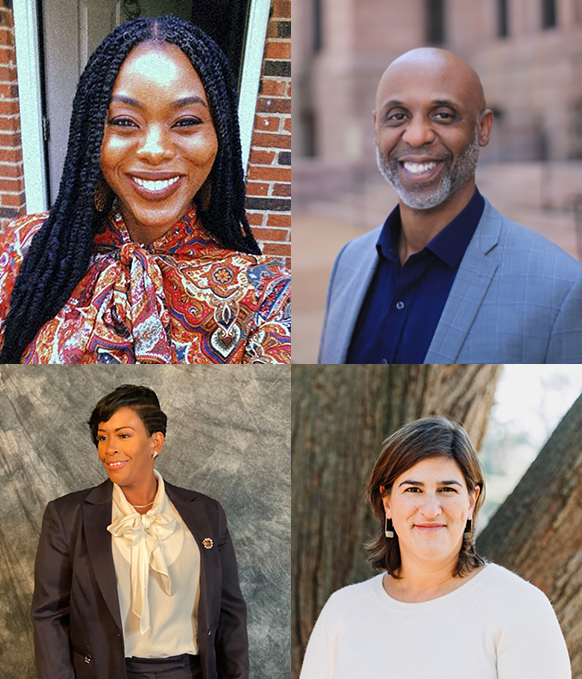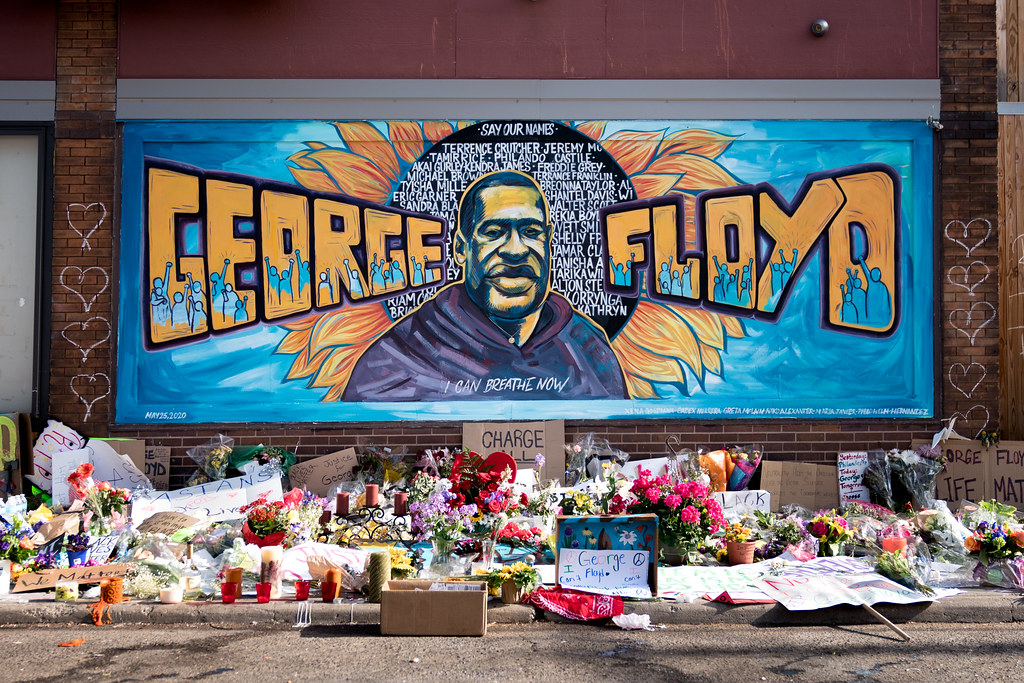Community Engagement Featured Jurisdictions Racial Disparities May 24, 2023
It has been three years since George Floyd’s death at the hands of Minneapolis Police Officer Derek Chauvin on May 25, 2020. Mr. Floyd’s murder energized an international movement for racial justice with many pledging to change the role of law enforcement and more.
But what has changed? We asked individuals involved with the MacArthur Foundation’s Safety and Justice Challenge (SJC) to reflect on the landscape for criminal justice reform.

Chandra Tyler, Safety and Justice Challenge Equity Inclusion Consultant for Mecklenburg County
As we approach the three-year anniversary of George Floyd’s brutal death, I sit in deep reflection with both heaviness and hope. The devastating tragedy on May 25, 2020, which ignited an enormous blaze of protests, policy changes and social movements, appeared to be the long overdue awakening that so many fought and prayed for. Fast-forward to present day. America’s sense of urgency and progressive efforts has slowly lost its fire.
“It feels more like a Superbowl commercial. It came and it went,” Gemini Boyd, a member of the Mecklenburg County Community Engagement Task Group recently told me.
Though disappointing, these are the moments that remind us why we continue this race. Mecklenburg County Criminal Justice Community Engagement Task Group is just getting started. With intentionality and vision, we are mending the relationships between community and systems, pouring into our youth, and identifying gaps and resources needed to build a viable, sustainable, and equitable greater Mecklenburg County community. Through our 3 E’s: Engagement, Education, and Empowerment, our mission is to lead with collaboration and improve policy and practice changes in the criminal justice system. In honor of George Floyd and countless others, we press on. The marathon continues!
Wilford Pinkney Jr., Director of the Office of Violence Prevention at the City of St. Louis
The murder of George Floyd was a catalyzing moment. It created a window of opportunity, but sustaining the momentum is the challenge. The key to sustaining reform is collaboration, a comprehensive approach and sustainable infrastructure.
Since 2020, St. Louis has enacted numerous policies related to reimagining public safety. We did not have to look far for solutions. Numerous reports were published in the last nine years that created a comprehensive picture and outline for a strategic focus. The reports promoted collaboration and pointed to the need for a comprehensive approach to address existing inequities in order to create safe and healthy communities. The challenge was not ideas; it was action. Collaborations were created in 2020 that started the process of better aligning resources and redesigning systems, structures, and policies. We started building the infrastructure for a new system of public safety.
In 2021 Tishaura Jones was elected mayor on a platform of using national models of public safety and rejecting the false choice between being “tough” on crime and addressing the root causes of violence. This approach garnered support from diverse stakeholders ranging from the elected leaders and community organizations to residents in the cities most impacted neighborhoods. Under Mayor Jones’ leadership the Office of Violence Prevention (OVP) was created by ordinance and seeded with ten million dollars which ensures it is a permanent part of the city’s government structure.
The mayor’s comprehensive approach to public safety also includes policies aimed at designing safer streets, offering down payment assistance and guaranteed basic income to low-income residents, and year-round jobs for youth. St. Louis has the model for sustaining reform, a committed chief executive, a strategic focus, support from a diverse group of stakeholders, and sustainable strategies.
Rev. Dr. Michelle Anne Simmons, Founder and Executive Director of Why Not Prosper, Inc.
George Floyd’s death brought people’s awareness of racism back to life. People have a new lens on since it happened, and it’s still an intense change in how we are all looking at the world. There needs to be a differentiation between the understanding of racism and this focus on diversity, equity, and inclusion (DEI) training, though, because it’s different. The city of Philadelphia has done a lot to intentionally focus on DEI. And funding has shifted because of it. But there does need to be that deep commitment to focusing on racism.
In Philadelphia, specifically, the advocates and the organizers are taking no stuff. We’ve got commissions for jail, the police, parole, the prisons, and probation. Because the funding is there and people are sick and tired of the historical racism, all those things are coming together. And you can’t miss out on the anti-violence work either. People are more aware of things now. I feel our justice partners are coming around. They’re used to the same old systems. But they’re starting to pull back the curtain on racism and realize how they can change things. They’re just beginning to pull the curtain apart and say, “Now let me see what this is about, and how I might help.”
Lisa Varon, Deputy Director of the Office of Criminal Justice at the City of Philadelphia
In the three years since the murder of George Floyd, there has been a shift to focus on community strength instead of community suffering. In Philadelphia, an innovative sustainability plan is in place to bring in more meaningful community involvement and to continuously engage justice stakeholders in actionable reform efforts. To date, the city of Philadelphia has made an annual commitment north of two million dollars in the General Fund to support a wide range of initiatives and related personnel, that supplement the series of investments made through SJC. This work has three major components: experiential learning opportunities for criminal legal system stakeholders, several capstone-focused workgroups (all with a racial equity focus), and the eventual merging with the county Community Justice Advisory Board (CJAB).
The experiential learning opportunities are an imaginative way of breaking down some of the silos that exist in the various criminal legal systems sectors. The learning opportunities look like robust pieces of training in racial equity and implementing reforms, site visits to local community-based organizations, and chances to explore the criminal legal system by learning how people travel through the legal system and identifying where people are most likely to get caught up in the system.
As previously mentioned, sustainability efforts in Philadelphia have already begun. There are five SJC-focused workgroups that are continuing to propel this work forward: jail reduction strategy, data, community engagement/ racial and ethnic disparities, pretrial, and the common pleas case processing workgroups. All these groups have two things in common: dedication to the sustainability of promising practices and a commitment to have racial equity built into the reforms the groups hope to produce.
Lastly, when we think of how far we have come in criminal legal system reform in the three years since the death of George Floyd, the most important thing to do is look forward. The work of the SJC will only be ending in name in Philadelphia. Strategic workgroups will continue to convene through the Philadelphia CJAB with the expectation that they will produce actionable recommendations for change in the local system. In addition, we are maintaining our commitment to bring the necessary City resources to sustain these efforts and outcomes as a long-term investment strategy in our community.

